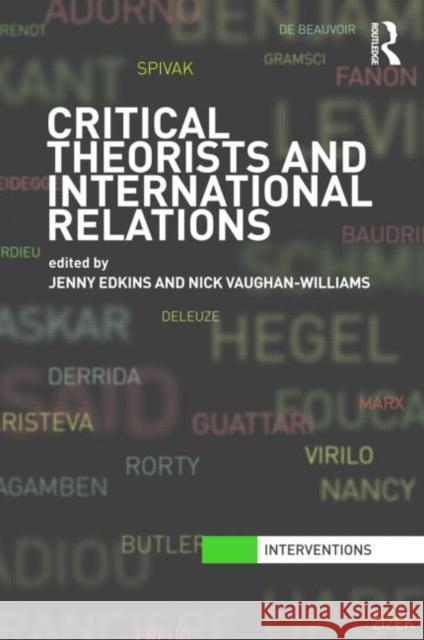Critical Theorists and International Relations » książka
Critical Theorists and International Relations
ISBN-13: 9780415474665 / Angielski / Miękka / 2009 / 424 str.
Critical Theorists and International Relations
ISBN-13: 9780415474665 / Angielski / Miękka / 2009 / 424 str.
(netto: 255,46 VAT: 5%)
Najniższa cena z 30 dni: 246,78
ok. 16-18 dni roboczych.
Darmowa dostawa!
A wide range of critical theorists is used in the study of international politics, and until now there has been no text that gives concise and accessible introductions to these figures. Critical Theorists and International Relations provides a wide-ranging introduction to thirty-two important theorists whose work has been influential in thinking about global politics. Each chapter is written by an expert with a detailed knowledge of the theorist concerned, representing a range of approaches under the rubric 'critical', including Marxism and post-Marxism, the Frankfurt School, hermeneutics, phenomenology, postcolonialism, feminism, queer theory, poststructuralism, pragmatism, scientific realism, deconstruction and psychoanalysis. Key features of each chapter include:
- a clear and concise biography of the relevant thinker
- an introduction to their key writings and ideas
- a summary of the ways in which these ideas have influenced and are being used in international relations scholarship
- a list of suggestions for further reading
A unique and invaluable resource introducing students to the key critical theorists whose work has been influential in the field of international relations. The book covers a broad range of approaches within critical theory including Marxism and post-Marxism, the Frankfurt School, hermeneutics, postcolonialism, feminism, poststructuralism, deconstruction and psychoanalysis.
Each chapter contains a short biography of the relevant thinker that sets their work in context, an introduction to their key writings and ideas, including definitions of important terms, and a summary of the ways in which these ideas have influenced and are being used in international relations scholarship.
Thinkers covered include Adorno, Agamben, Arendt, Badiou, Baudrillard, Bourdieu, Butler, Benjamin, De Beauvoir, Deleuze & Guattari, Derrida, Fanon, Foucault, Gramsci, Habermas, Kristeva, Levinas, Nancy, Ranciere, Rorty, Said, Schmitt, Spivak, Virilio and Zizek. The book also contains short introductions to important thinkers whose work is influential in critical theory including Hegel, Heidegger, Kant, Marx and Nietzsche.











